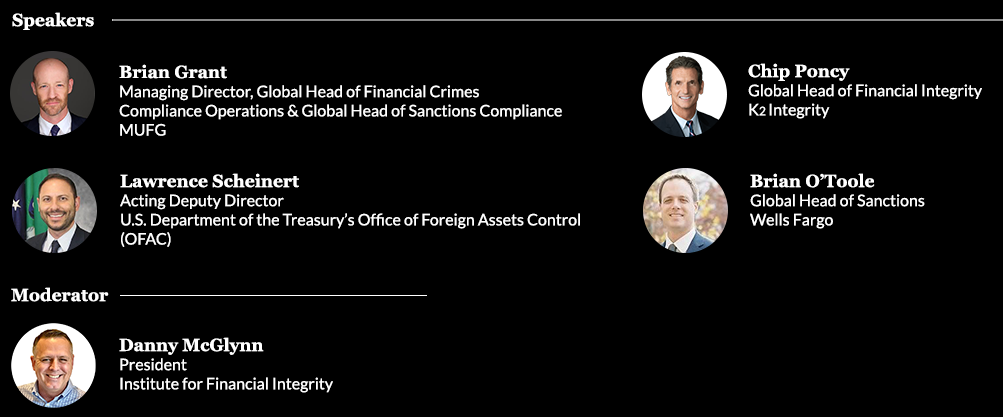The New Counter-Illicit Finance Regime
AML/CFT and Sanctions Regimes Have Converged to Form a New Paradigm
📅 February 13, 2024
📅 February 13, 2024
Anti-money laundering / countering the financing of terrorism (AML/CFT) regimes and sanctions regimes, once seen as separate, have been converging for well over a decade and can now be thought of as overlapping parts of a broader counter-illicit finance regime. The international response to Russia’s invasion of Ukraine—and in particular the growing focus by policy-makers regulators, and financial institutions on countering Russian sanctions evasion—has significantly accelerated this development.
This came into stark view when the U.S. Treasury Department’s lead AML agency—the Financial Crimes Enforcement Network (FinCEN)—issued an alert in 2022 requesting increased vigilance for potential Russian sanctions evasion attempts, and when Treasury’s lead sanctions agency—the Office of Foreign Assets Control (OFAC)—published an advisory in 2023 stressing to financial institutions the importance of implementing customer due diligence (CDD) procedures and other AML controls to mitigate risks associated with Russia sanctions.
Meanwhile, the United Kingdom’s primary AML regulator—the Financial Conduct Authority (FCA)—has increased its focus on the sanctions systems and controls adopted by the firms it regulates in response to the sanctions imposed since Russia’s invasion of Ukraine and has issued guidance to help firms deliver greater compliance with sanctions. Moreover, the European Union’s new AML/CFT Authority (AMLA) has been charged with checking compliance with sanctions-related measures by the riskiest groups in the financial sector, contributing to a common supervisory approach to verification of compliance with sanctions-related requirements, and “providing critical input to the understanding and mitigation of risk of sanctions evasion/non-implementation at the Union level.”
A senior U.S. Treasury official speaking at an anti-money laundering conference in late 2023 discussed this convergence and its implications for financial institutions: “the two areas of highest priority for my office—sanctions to advance the foreign policy goals of the U.S., and the strengthening of the U.S.’s own AML/CFT regime—are deeply linked … the continued siloing of AML/CFT and sanctions departments at some financial institutions can lead to financial institutions unwittingly, or inadvertently, processing payments involving designated entities.”
Indeed, financial crimes and sanctions compliance teams in many banks have significantly increased coordination, collaboration, and information sharing, particularly related to detecting and investigating potential sanctions evasion activities by Russian, Iranian, and North Korean actors. As it turns out, the methodologies used by sanctioned actors to access the financial system and by individuals and entities involved in financial crimes are often similar. And therefore, many of the red flags for sanctions evasion are the same or similar to longstanding AML-related red flags, like the use of shell companies and third-party intermediaries.
Despite the growing convergence of AML/CFT and sanctions regimes and overlap between financial crimes and sanctions risk management and compliance, AML/CFT programs, rules, and requirements are very different from sanctions programs, rules, and requirements. Too often, too many institutions and regulators incorrectly view sanctions through the prism of AML or “Anti-Financial Crime (AFC).” Sanctions violations are not financial crimes violations (most sanctions violations are in fact civil law, not criminal law, violations) and sanctions risk management and compliance should not be viewed as a sub-set of financial crimes risk management and compliance.
Instead, these disciplines are better viewed as overlapping parts of a broader counter-illicit finance paradigm. The global counter-illicit finance mission represents the collective commitments and efforts of all global stakeholders to combat both financial crimes though the development and implementation of AML/CFT regimes and threats to national, regional, and collective security through the development and implementation of financial and economic sanctions regimes.
Viewing AML/CFT and sanctions as part of a broader counter-illicit finance paradigm enables key global, jurisdictional, and private-sector stakeholders to develop and implement more effective, efficient, and holistic strategies, standards, policies, and risk management and compliance programs—ultimately leading to better outcomes in protecting and advancing the integrity of the global financial system.
The Institute for Financial Integrity hosted a webinar on the convergence of sanctions and financial crimes compliance featuring a panel of experts.
Key topics addressed included:











 Walking the Sanctions Tightrope
Walking the Sanctions TightropeThis site uses cookies. By continuing to browse the site, you are agreeing to our use of cookies.
Accept settingsHide notification onlySettingsWe may request cookies to be set on your device. We use cookies to let us know when you visit our websites, how you interact with us, to enrich your user experience, and to customize your relationship with our website.
Click on the different category headings to find out more. You can also change some of your preferences. Note that blocking some types of cookies may impact your experience on our websites and the services we are able to offer.
These cookies are strictly necessary to provide you with services available through our website and to use some of its features.
Because these cookies are strictly necessary to deliver the website, refusing them will have impact how our site functions. You always can block or delete cookies by changing your browser settings and force blocking all cookies on this website. But this will always prompt you to accept/refuse cookies when revisiting our site.
We fully respect if you want to refuse cookies but to avoid asking you again and again kindly allow us to store a cookie for that. You are free to opt out any time or opt in for other cookies to get a better experience. If you refuse cookies we will remove all set cookies in our domain.
We provide you with a list of stored cookies on your computer in our domain so you can check what we stored. Due to security reasons we are not able to show or modify cookies from other domains. You can check these in your browser security settings.
These cookies collect information that is used either in aggregate form to help us understand how our website is being used or how effective our marketing campaigns are, or to help us customize our website and application for you in order to enhance your experience.
If you do not want that we track your visit to our site you can disable tracking in your browser here:
We also use different external services like Google Webfonts, Google Maps, and external Video providers. Since these providers may collect personal data like your IP address we allow you to block them here. Please be aware that this might heavily reduce the functionality and appearance of our site. Changes will take effect once you reload the page.
Google Webfont Settings:
Google Map Settings:
Google reCaptcha Settings:
Vimeo and Youtube video embeds:
You can read about our cookies and privacy settings in detail on our Privacy Policy Page.
Privacy Policy